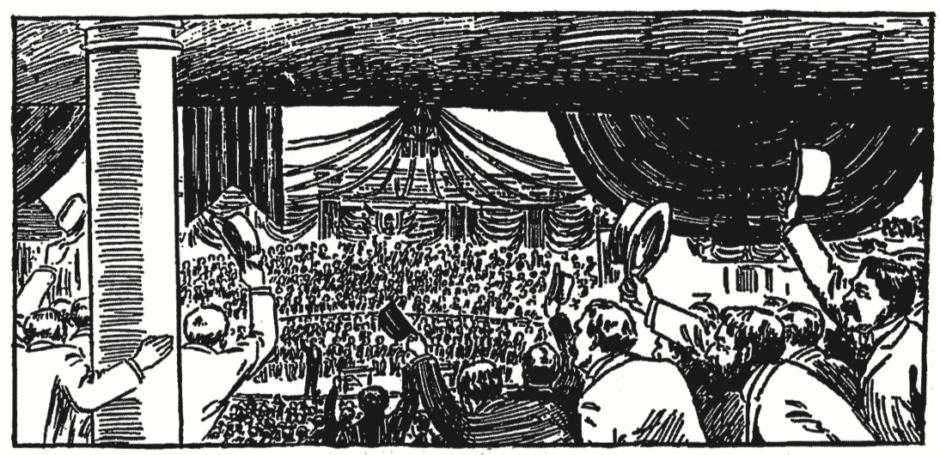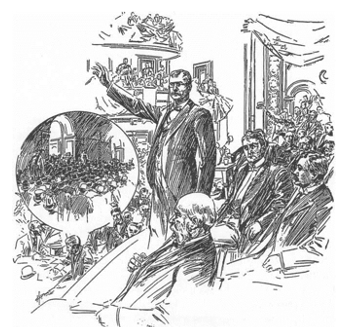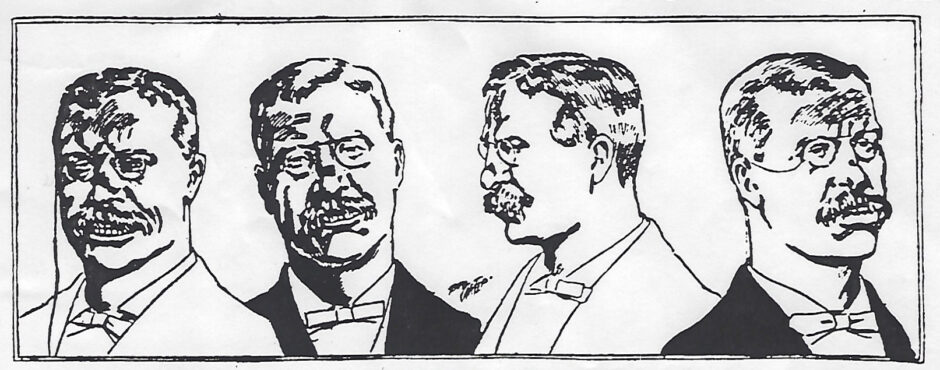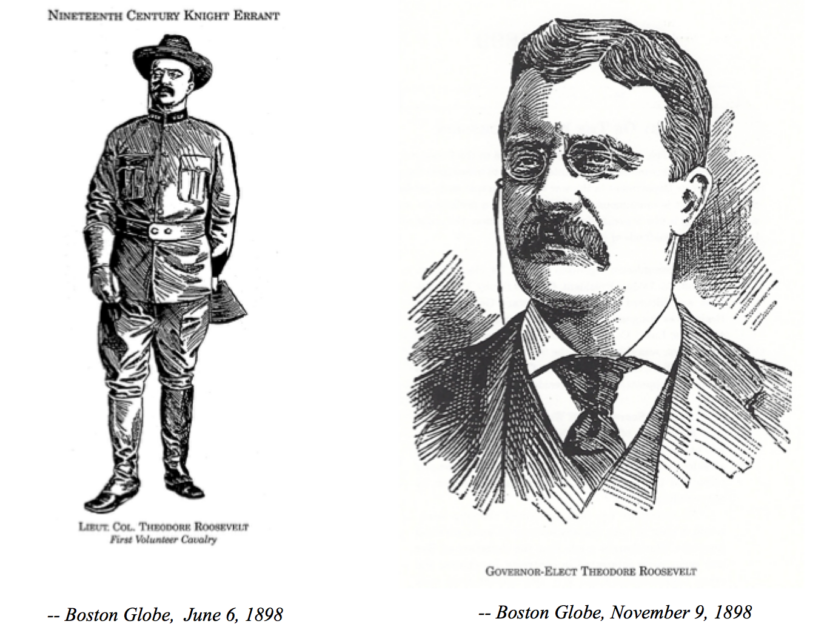Publisher’s Note: AAQ / East End is not a nonprofit organization — however, AAQ posts 125+ announcements monthly from cultural nonprofit organizations on the East End at no charge to those organizations — and AAQ prepares exclusive portfolios (100+) on art, architecture, preservation & historic sites at its own expense.
As a grassroots online publication, Donations, Resource Plate ads or Portfolio Sponsorships to sustain its mission would be greatly appreciated.
DONATE
Resource Plate inquiries for specs, rates, further information: info@aaqeastend.com
Thank you!
~~~~~~~~~~~~~~~~~~~~~~~~~~~~~~~~~~~~~~~
Editor’s Note: important dates in Roosevelt’s career, 1898
—- January 1 – May 6, Assistant Secretary of the Navy
—- April 21st, U.S. declares War on Spain.
— April 22nd, Leonard Wood commissioned as Colonel of the United States 1st Volunteer Cavalry Regiment & Theodore Roosevelt as Lieutenant-Colonel.
— July 1st, Charge at San Juan Hill, Santiago de Cuba. Roosevelt commissioned Colonel of the 1st U.S. Volunteer Cavalry Regiment / popularly known as the Rough Riders.
—- August 12th, Peace Protocol signed with Spain, pausing the war.
—- August 15th, Rough Riders disembark the Transport Miami at Fort Pond Bay, Montauk.
—- September 27th, Nominated as Republican Candidate for Governor, in Saratoga, New York.
—- November 9th, Theodore Roosevelt elected Governor of New York State.
— December 10th, Treaty of Paris signed between Spain & the United States, ending the war.
The following newspaper account is an edited compilation of contemporary news reports from the following newspapers; published on October 6, 1898: New York Times, The Sun, The World, Commercial Advertiser, and the New York Press. This is an abridged account of that event printed in BULLY! For the complete report see pages 427 – 441.
~~~~~~~~~~~~~~~~~~~~~~~~~~~~~~~~~~~~~
Roosevelt Fires First Campaign Gun

Magnificent Ovation At Carnegie Hall
As many people as could get into Carnegie Hall, and a great many more, met last night to ratify the nomination of Col. Theodore Roosevelt for Governor of New York… .
It was a remarkable audience inside the hall. It was well dressed and orderly. The only objection the Republican managers found to it was that it was too fashionable. Magnificently dressed women occupied the boxes in the galleries and men in evening dress sat or stood beside them. It looked like a grand opera night, one of the Republican leaders said — and that was the only fault he could find with the splendid assemblage. “This is not vote-getting, but it is magnificent.”
A greater audience had never assembled in Carnegie Hall, because a greater audience could not have got inside its walls. From the rear depths of the platform to the remotest shady nooks of the topmost gallery, every inch of space was occupied. Men and women stood in the aisles, leaned over the platform edge, and pressed against the walls. If any one else had come in, he would have had to stand on the heads of those already there.
It was a brilliant scene, formed by thousands of faces, framed in the profuse drapery of flags. The bright dresses of the women in the galleries outshone even the flash of the National stars, and fans and lace handkerchiefs waved applause to the speakers and fluttered tremulously above the throng at each mention of the name of the Rough Rider of San Juan. The galleries and stage were draped with the National colors in flags and bunting, and great rosettes, formed by groups of banners, were studded with shields bearing the Nation’s coat-of-arms. Long pennants drooped from the first balcony, and semicircles of flags and bunting faced and hid the railing of all the galleries clear to the top eagle nest, where there was just as much demand for room as in the parquet or on the platform.† There was a huge portrait of Col. Roosevelt on the wall at the back side of the stage, surrounded by flags, the picture itself painted in red, white and blue.†† ……..
“Ladies and Gentlemen,” said General Woodford, “I now have the great pleasure of introducing Col. Theodore Roosevelt, Republican nominee for the great office of Governor of New York,” and then the fun started all over again. Cracked voices and whole voices and Rough Riders and laymen, when Col. Roosevelt stepped to the front, did their best to convince him that he was a bigger man even than Dewey. The Colonel looked serious when he first stepped forward, but at the end of about half a minute’s shouting he couldn’t help smiling, and the smile grew broader. He gave one disapproving glance up at the box where Mrs. Roosevelt and little Miss Roosevelt sat.
Little Miss Roosevelt couldn’t help being just as enthusiastic as everybody else. The Colonel waved his hand at her. The whole audience was on its feet again. The Rough Riders, who appeared to have yelled themselves out, now showed that they hadn’t even done their best. They used their hands and feet as well as their voices. When at last there was a sign of the enthusiasm dying away, there was a mighty shout of “Who’s all right?” and a mighty roar in response “Teddy.” That started a laugh, but before it had much more than started there was another shout “Who is Teddy?” and like the roll of thunder came back the response “First in war, first in peace, first in the hearts of his countrymen.” Thumpty—thump—thump—thump—thump—thump- ty—thump—thump—thump. This last being made with the feet and with a vigor that fairly shook the building.††

Mr. Roosevelt took up his speech with a manner which seemed to say, “Well, ladies and gentlemen, I have had no time to become much of a speaker, but I have some ideas which I have written down and which I am going to read to you.” What he did say, however, was “Mr. Chairman” which he called out in the peculiar unoratorical rough and ready way that marked his speaking. It was as if the chairman was in another room and Roosevelt called to him to join him in a very important piece of business. He delivered his speech like an enumeration of things which he held dear and was sure that everybody else could not help to take them in the same spirit. As a speaker he is as much a Rough Rider as he showed himself to be at Santiago, and all his lack of oratorical skill notwithstanding everybody soon forgot that it was from a typewritten copy that he was speaking. He conversed with the audience on matters of vital importance to all of them. That’s all the crowd knew. Aggressive sincerity marked his every word and every gesture. When he grew particularly emphatic, when he seemed to be defying the whole world to dispute the logic of his words, he would shake one or two fingers at the gallery, showing his teeth all the while and presenting a picture of the fighter as well as the man of unshakable convictions. When he was interrupted by applause, he would feel genuinely disappointed. “Wait a minute!” he once shouted, impatiently, and an outburst of good-natured laughter kept him fidgeting for a minute or two longer.††††
————————
“Mr. Chairman And You, My Fellow Citizens… . First and foremost, this campaign is a campaign for good government, for good government both in the Nation and the State. If I am elected Governor, I shall try to make good the promises, both expressed and implied, made on behalf of my candidacy, for I shall try to so administer the affairs of the State as to make each citizen a little prouder of the State, and I shall do my best to serve my party by helping it serve the people. So far as in me lies, I shall see that every branch of the government under me is administered with integrity and capacity, and when I deal with any public servant, I shall not be very patient with him if he lacks capacity, and short indeed will be his shrift if he lacks integrity. I shall feel most deeply my responsibilities to the people, and I shall do my best to show by my acts that I feel it even more deeply than my words express.
“There comes a time in the life of a nation, as in the life of an individual, when it must face great responsibilities, whether it will or no. We have now reached that time. We cannot avoid facing the fact that we occupy a new place among the people of the world and have entered upon a new career. All that we can decide is whether we shall bear ourselves well or ill in following out this career. We can see, by the fate of China, how idle is the hope of courting safety by leading a life of fossilized isolation. If we stand aside from that keen rivalry with the other nations of the world, to which we are bidden alike by our vast material resources and the restless, masterful spirit of our people, we would perhaps for a few decades be allowed to busy ourselves unharmed with interests which to the world at large seem parochial; but sooner or later, as the fate of China teaches us, the safety which springs from the contemptuous forbearance of others, would prove a broken reed. We are yet ages from the millennium; and because we believe with all our hearts in the mighty mission of the American Republic, we must spare no effort and shrink from no toil to make it great.

“Greatness means strife for Nation and men alike. A soft, easy life is not worth living, if it impairs the fibre of brain and heart and muscle. We must dare to be great; and we must realize that greatness is the fruit of toil and sacrifice and high courage.
“The guns of our warships in the tropic seas of the West and the remote East have awakened us to the knowledge of new duties. Our flag is a proud flag, and it stands for liberty and civilization. Where it has once floated, there must and shall be no return to tyranny or savagery. We are face-to-face with our destiny, and we must meet it with a high and resolute courage. For us is the life of action, of strenuous performance of duty; let us live in the harness, striving mightily; let us rather run the risk of wearing out than of rusting out… .
“That the question of our National defenses is a very real question and may at any time become of vital moment has been brought home to all of us within the last six months.
“This Nation is a great, peaceable Nation, both by the temper of its people and by its fortunate geographical situation, and is freed from the necessity of maintaining such armaments as those that cramp the limbs of the powers of Continental Europe. Nevertheless, events have shown that war is always a possibility, even for us. Now, the surest way to avert war, if it can be averted, is to be prepared to do well if forced to go into war. If we don’t prepare for war in advance, then other powers will have a just contempt for us. They will fail to understand that with us unreadiness does not mean timidity, and they may at any time do things which would force us to make war, and which they would carefully refrain from doing if they were sure we were ready to resist them…. It is to our interest to be prepared, both because, thereby, we are most likely to secure peace, and because, if war does come, we minimize, by our preparations, the chances of humiliation to the nation and suffering to the individual citizen.
“Our experience with the navy offers a case in point. Very soon after the Civil War we let our navy utterly run down, until on the seas we became of less moment that any third-rate power. In consequence, we had occasionally to suffer from Spain, as in the Virginius affair, injuries which she would not have dreamed of inflicting had we been ready to retaliate.
“Fifteen years ago we began to build up the navy. The first great service this new navy performed was in 1890, when, by the mere fact of its existence, it served to prevent war with Chili. Nothing but our having the ships and being ready to use them made Chili keep the peace; and, as a mere matter of expense, the war which the navy thus averted would have cost many times more than the whole cost of the navy for the past fifteen years.
“The second great service performed by the navy for the country was this year when we were at last forced into war and when our thoroughly prepared navy, with its splendid material and splendid personnel, at once gained for us the command of the seas and thereby insured our victory. But let one who spent some very active months in helping make ready the navy for this war warn you against believing that even yet we have a navy equal in size to our national needs or our national greatness.
“Those who remember the panic into which our whole seacoast was thrown at the outset of the war will make up their minds that we need a powerful navy; not merely to protect our great interests — far greater now than ever before — in the islands of the ocean, but also to defend our own coasts. When I say defend, I wish it understood that I use the word in its proper sense, for the only defensive that is worth anything is the offensive. A peaceable man must not brawl; but when forced to fight, if he is worth his salt, he will defend himself by hitting and not parrying. We want a navy which will defend us from the enemy by punishing that enemy; a navy which can strike as Hull and Perry struck in the days of our grandfathers; as Farragut and Porter struck in the Civil War, and as Dewey and Sampson and Schley struck in the war that is just over.
“We want to build up our army, exactly as the navy has been built up within the last fifteen years. We have got to show forethought and willingness to spend the money that is necessary for the task. If we fail to exercise such forethought and to show such willingness to stand the necessary burdens year after year, we have then got to thank ourselves if, when the strain comes, the downright fighting capacity of the officers and men has to be relied upon to make good the faults which would never have existed if we had an army of sufficient size, and if we yearly put that army through maneuvers which would test it as an army and not as an aggregation of small units, each unit excellent in its way, but each utterly unaccustomed to work on a large scale with the others… .
“We need a far larger regular army than we now have, and we need to have it trained on a larger scale than it has been trained for the last quarter of a century. We don’t need it in the least for police purposes at home; we don’t need it to preserve order, for our people are quite able to preserve order themselves, but we do need it to protect our interests abroad.
“I doubt if there is an American to-day so ungenerous as not to appreciate the debt of gratitude he owes to the splendid officers and splendid men of the regular army, and we want to make our gratitude tangible by building up the regular army.
“We in New York, like the people in the rest of the Union, must do our full share in building up another branch of our armed forces, the branch to which I myself have had the honor to belong. I mean our volunteer soldiers. They have won high credit for themselves in this contest. In Cuba, in Porto Rico and in the Philippines, they have spent their strength, poured out their blood, and won their right to a full share in the ultimate triumph. They have manned the small vessels that kept watch over our coasts, and they have contributed hundreds, aye, thousands of sailors to the cruisers, and even to the great battle fleets.
“The Volunteers, the National Guard and the Naval Militia alike feel that they did their duty by the country, and they ask in return that the country should provide for them the means which would enable them to do their duty even more effectively in the future… . It is our duty to take immediate steps to see that they are armed with the best modern weapons and managed according to the best system; so that, on the one hand, the utmost can be got out of each man as a fighting machine while, on the other hand, his health and well being are assiduously cared for.
“So much for the steps that are necessary if we are to uphold the honor and maintain the interest of the nation abroad. But we can do neither the one, nor the other, if we fail at home so to order the affairs of our national, State and municipal households as to secure both our moral and our material well being, for though material prosperity is indispensable yet it cannot, by itself, atone for the lack of that higher and finer moral and spiritual excellence which ultimately counts for more than all else in the true life of a great nation….
“Honesty we must have; no brilliancy, no ‘smartness,’ can take its place. Indeed, in our home affairs, both in the State and the municipality, it has always seemed to me that what we need is not so much genius, as the homely, everyday virtues of common sense and common honesty.
“Of course, there are many problems for the solution of which we need the best intellect of the commonwealth. But, for the ordinary public officer, what is necessary is to be watchful, energetic, broadminded and disinterested. Every one will make mistakes, and when made the best remedy is cheerfully to recognize their existence and promptly proceed to undo them. If we proceed in this way, if we promptly punish men who misbehave and sternly refuse to let any consideration either of political or personal friendship be treated as an offset to wrong-doing, it is not very difficult to secure that honest administration which is indispensable if our republic is to endure. No influence of any kind must avail to shield the wrongdoer, be he of high or low degree.
“In dealing with our citizens it is always best, where possible, not to treat any one group as a class apart. On most points the interests of the working-man, of the man who toils with his hands, are simply those of all good American citizens. Yet he has special interests; interests that are peculiarly his. Wherever he can be helped, he most certainly should be helped. Ordinarily, I firmly believe and shall ever insist that the help that will most surely avail the man who works is self-help. But the history of many of the trades’ unions has shown that very much can also be done by that form of self-help where many join together to help one another.
“It is not well to teach any one to rely mainly upon the state, for the state can never play any but a subordinate part in a man’s welfare. Primarily, the man must rely on himself. Yet, the fact remains that along certain lines a great deal can be gained by legislation. Legislation cannot make a man prosperous, for it cannot make him honest or thrifty or industrious; but it can sometimes secure the fruits of honesty, thrift and industry to the rightful owners….
“Yet, after all, it seems to me that the great lesson to be taught our people is the lesson both of brotherhood and of self-help. In our several ways each of us must work hard to do his duty; each must preserve his sturdy independence; and yet each must realize his duty to others. And to each who performs his duty in whatever way, must be given the full measure of respect… .
“The man of leisure and the man to whom life had always been one of toil sprang together at the call of their country and stood side by side to share the same labor and to face the same death. They did whatever they were called to do. They served in the ranks and they bore commissions as fate and their own efforts willed it, but wherever they served they were American soldiers, no more and no less. Living, each one strove incessantly to do even more than his duty, scorning to do less, and ashamed to falter or ask for aid, yet always glad to help a brother who, however willing, was weaker. Dying, each faced with equal courage the fate which, in an instant of time, blots out all the differences that we rear with such infinite labor on this earth.
Living and dying, they gave us a lesson in American citizenship, and this lesson which they taught in the war, let us profit by as we live in peace.”
————————

During the time the candidate was speaking, the Rough Riders on stage were in a broad grin of delight. One of them had a tattered handkerchief with which he alternately mopped his face and shook with such vigor that he had little but the hem left when the speech was ended amid the heartiest and most vociferous applause ever given a speaker on a New York platform… †††††
(† New York Times, †† The Sun, ††† The World,
†††† Commercial Advertiser, ††††† New York Press)
————
ADDENDA
———
Of One Mind And One Purpose
If anybody had said a year ago that a crowd made up as this one was would have gathered this year of one mind and one purpose to shout itself hoarse for the Republican candidate for Governor of the State, that man would have been put down as crazy. — October 6, 1898 / The Sun.
————
ROOSEVELT VICTORIOUS
The Whole Republican State Ticket Elected
Wins by nearly Thirty Thousand Plurality
— New York Tribune, November 9, 1898 / BULLY! pp 451 – 452.
————
Senator Platt’s Gratitude
“I feel that Col. Roosevelt deserves all honor and credit for the victory in the State, for I am certain that he is the only man who could have carried our standard to victory this year. Beside his strong personality, he possesses remarkable physical resources, which were no small factor in the campaign just ended.
“Indeed, I know of no other man who would have been able to conduct the canvass he has made without breaking down before the schedule was completed. The Republicans of New York State are indebted to Col. Roosevelt in no small degree for our splendid triumph to-day, and he has my heartiest congratulations and best wishes.
—- Senator Thomas C. Platt / Commercial Advertiser, November 9, 1898.
Ed Note: U.S. Senator Thomas C. Platt was known as the Republican Political Party boss — he initially opposed the nomination of Col. Roosevelt, preferring incumbent Republican Governor, Frank Black, who was seeking re-election. Roosevelt’s extraordinary popularity as a national war hero, however, changed his mind.
See page xviii of BULLY! for more.
~~~~~~~~~~~~~~~~~~~~~~~
Illustration credits in order of presentation:
— New York Press, W.H. Shindler / BULLY! p. 440.
— New York Herald / BULLY! p. 432.
— The World, Carter, illustrator / BULLY! p. 437.
—————————-

————————————–
BULLY! Colonel Theodore Roosevelt, The Rough Riders & Camp Wikoff, Montauk, New York 1898. Second Edition, Published by Montauk Historical Society & East End Press, with a Grant from the Gardiner Foundation, 2023.
BULLY! is now available on Amazon.
————
Visit: Camp Wikoff Self-Guided Bike / Hike & Run Tour /
9 Sites from Montauk Station > Lighthouse > Fort Pond Bay …. link
——— AND ———
Visit: BULLY! Col. Theodore Roosevelt, The Rough Riders & Camp Wikoff, Montauk, NY — 1898 …. link
__________________________________________________
